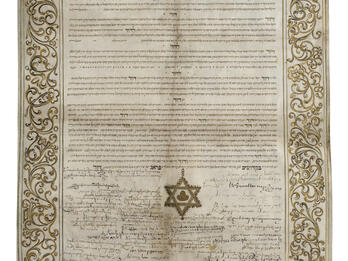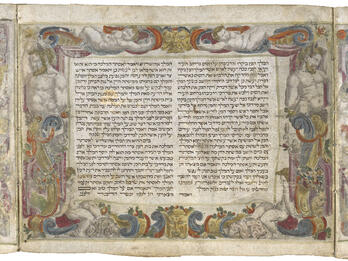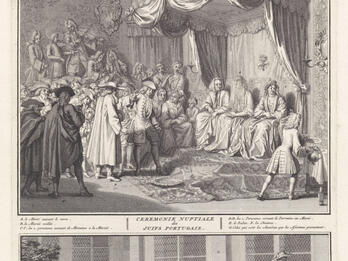Two Authorizations Given to Female Slaughterers
Permission that I Granted to a Lady to Slaughter
Stronger than the lions’ den [see Song of Songs 4:8; 2 Samuel 1:23], raise a banner over Mount Zion [see Isaiah 13:2], they are the mighty ones [see Genesis 6:4], the geonim who from the time of the completion of the Talmud have advanced in age and performed valiant deeds [see Job 21:7].
The ruling, of halakhah, was that an intelligent woman who understands the laws of ritual slaughter is fit to slaughter nonsacred animals. Now, this can be argued logically, for an impure spirit passes over whoever eats meat of lust [see, e.g., b. Ḥullin 16b–17a], ascending and breaking through [b. Nazir 54a] from the root of the primeval snake. Its animal contamination tempted her to eat from the tree of lust [see Genesis 3:6]. She was the mother of all living beings (Genesis 3:20) that do not speak but feel with the sense of touch, which is a disgrace to all pious, angelic individuals, who suffice with the minimum necessary: he lives on bread alone (Deuteronomy 8:3) and on herbs for the service of his Creator [see Genesis 3:18]. But one who wishes to enjoy it, as we do here this day, every man that which is right in his eyes [see Deuteronomy 12:7–8], may eat it healthily like a redeemed blemished sacrifice, in the manner of non-sacred meat prepared with the purity of sacrificial meat [see, e.g., b. Ḥagigah 19b–22b].
As for the difficulty raised in the land of Israel: Now that all joy is darkened (Isaiah 24:11), if a woman were to sacrifice, it would not be pleasing to God [see Malachi 3:4] but a meal-offering of memorial, bringing iniquity to remembrance (Numbers 5:15), and therefore her hands should be prohibited to slaughter, the answer was given as follows: We may not sacrifice to demons (Deuteronomy 32:17), for the holy altar is in the house of our Temple, and our messengers are agents of mitzvot who offer our sacrifices on our behalf: they are Zadok the priest from the house of Eli, a descendant of Phineas, who is Elijah. Since “a prosecutor cannot become an advocate” [see, e.g., b. Berakhot 59a], that is a fitting act for they who had the Temple, but not for us. For we dwell in a kind of cemetery, a field in which a grave has been plowed [see, e.g., b. Mo‘ed Katan 5b]; it is impure—the land of the nations shall be called impure [see, e.g., b. Shabbat 14b]. As they overpowered above its clumps and its air [see, e.g., b. Gittin 8b], but under the hand of rulers, in the upper crust of the land outside Israel, they are like one who has no God [b. Ketubbot 110b].
Indeed, we are idle, idle [see Exodus 5:17] from acts of righteousness, from following the old paths of a substituted world, to eat and be sated, to satiate the hungry soul, to quench the lust of a poor mind that does not stay on God [see Isaiah 26:3], the poor and wise child (Ecclesiastes 4:13) whose means fail with us [see Leviticus 25:35]. Therefore we say, Let us go and sacrifice to our God (Exodus 5:17), and the common people have become like the priest, the slave like his master (Isaiah 24:2), the right hand pushes away and the left hand draws near [b. Sotah 47a], and each woman with her neighbor [see Exodus 11:2] will bear for us a tribute like the bounty of the King [see Esther 2:18] who reigns in the midst of the land.
Accordingly, this noble and modest woman, the young woman, Mrs. So-and-So, has been examined on the laws of ritual slaughter, and has been tested and found to know all the laws written in the pamphlet. I myself have heard that she is of good sense, and she will obtain honor (Proverbs 11:16) for her teacher. She reviewed her studies before me, exactly as she was taught by So-and-So, her teacher. He too attests to her qualities and her competence and that one can rely on her slaughter. Consequently, I hereby authorize her and grant her permission to perform ritual slaughter, and I permit all Jews to eat the meat of her slaughter. However, this is on condition that she slaughters two or three times in the presence of an expert, to see if she faints, and if her hand is skilled enough to be as precise in the act of slaughter as required by the laws she knows so well. She should also be careful to read the laws that are in this pamphlet twice daily, in the morning and evening, for a period of three months, and then once a day for the following three months, and subsequently once a week for a full year, as well as once a month for the rest of her life, lest she forget the things which she saw with the eye of her mind [see Deuteronomy 4:9–10]. In accordance with the strength of her fear of God, she shall not depart from this commandment, as a result of which she should receive an eventual reward that she should merit male children who will teach Torah and observe the statutes and laws of God. May her eyes and the eyes of her father and she who bore her, and her brothers, and all her family, see good for many days, Amen.
Mantua, Rosh Ḥodesh Shevat, 5116 [January 12, 1556],
The youth, Isaac, the son of my honorable teacher and rabbi, Immanuel of Lattes, may he be remembered for the life of the world to come.
Copy of Permission That I Granted to a Female to Slaughter
Just as a man displays his might by sitting in tents, seeking and searching out wisdom [see Ecclesiastes 1:13], by studying both nature and man-made objects, so too the honor and glory of a woman is to sit at home and give a portion to her maidens and prepare food for her household [see Proverbs 31:15]. Thus, she is responsible for the entire management and organization of the house, as the popular saying goes: An elderly woman in the house—a good sign in the home [b. Arakhin 19a]. The reason is that the woman keeps the house running, as she ensures her husband has regular meals, and she also takes charge of the young children, to raise these lambs and kid goats on banks of sweet herbs (Song of Songs 5:13), in order to strengthen them in the service of their Creator. When they desire to eat meat, she will have already prepared her provision and also furnished her table [see Proverbs 9:2]. To ensure that strangers who are not of her family do not interfere with her work at home, it has become the custom of Jewish women to learn the laws of slaughtering, which is a commandment that our holy Torah commanded us for the improvement of our souls.
Now this honorable young lady of Israel, the modest Mrs. So-and-So, is splendid in all regards, and she knows all excellent things, and is expert in the laws of ritual slaughter detailed in this pamphlet, as she was taught by the elder, So-and-So. Her teacher attests to her qualities and her competence and that one can rely on her slaughter. I hereby authorize her and open the door for her to perform ritual slaughter, and that others may eat from her slaughtered meat. However, this is on condition that she slaughters two or three times in the presence of an expert, to see if she faints. Furthermore, she must review the material twice daily, in the morning and evening, for a period of three months, and then once a day for another three months, and subsequently once a week for a full year, as well as once a month for the rest of her life, lest she forget the things which she saw. May her worthy works praise her in the gates [see Proverbs 31:31], and may she enjoy the fruit of her labor, that she should be rewarded with marriage and children who will learn Torah and observe the commandments in Israel, in the lifetimes of her father and mother, her brothers, and her uncle and aunt. May they all see and rejoice in her good fortune, Amen.
Mantua, 23rd of Nisan, 5116 [April 2, 1556],
The youth, Isaac, the son of my honorable teacher and rabbi, Immanuel of Lattes, may he be remembered for the life of the world to come.
Credits
Published in: The Posen Library of Jewish Culture and Civilization, vol. 5.








